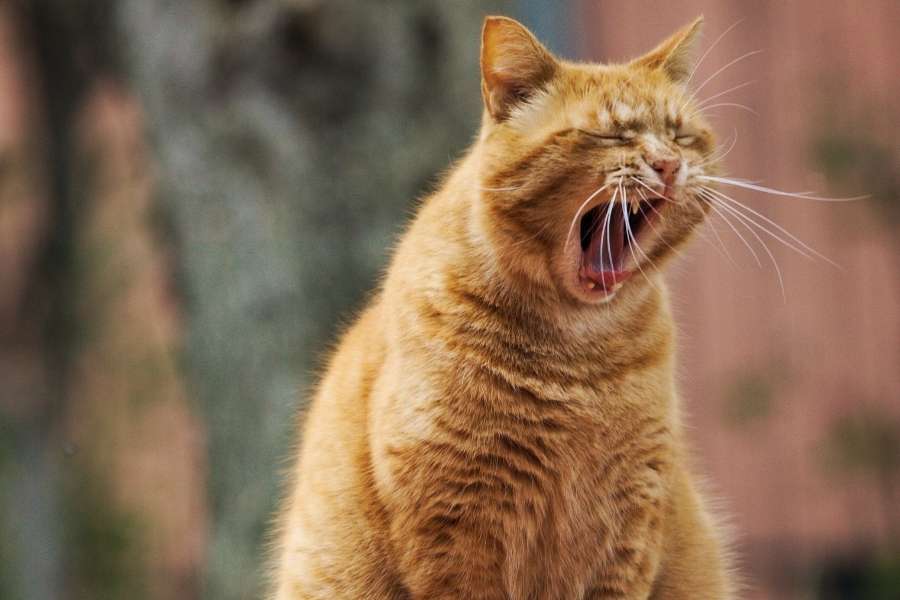Gagging is a natural process that helps cats clean their fur.
Cats groom themselves by licking their fur, and during the grooming process, they sometimes gag. Gagging helps remove dirt, debris, and other unwanted matter from their coats. It’s a normal part of cat behavior and there’s no need to be concerned if your cat gags occasionally.
However, if your cat starts gagging more often or appears to be in pain when he or she does so, it’s best to take him or her to the vet for a check-up.
Causes Of Cat Gagging
There can be various reasons why a cat might start gagging, but some of the most common causes include:
Eating too fast
There are several common causes of cat gagging, the most prevalent being eating too fast. It is well known that cats often eat quickly and greedily, gobbling up their food as quickly as possible.
However, this can lead to issues such as cat gagging, which occurs when the cat’s esophagus cannot keep up with the rate of food intake. This can cause discomfort and even vomit in some cases.
Eating foreign objects
Other contributors to cat gagging include eating foreign objects or ingesting hairballs due to grooming habits. To prevent cat gagging, it is important to feed your cat at a slower pace, cleaning up any stray pieces of food that may be left on the floor. By being mindful of these factors, you can help ensure that your cat stays happy and healthy for years to come.
Having a hairball
Some cats are simply prone to gagging and may need to be closely monitored for potential health issues. Other cats may be suffering from hairballs, which can cause discomfort, irritation, and even vomiting in some cases.
To help keep your cat healthy and minimize the chances of gagging and coughing, it is important to regularly groom your cat’s coat and provide it with plenty of high-quality cat food that is rich in nutrients and fiber.
This will help reduce any buildup of hair in your cat’s digestive tract, making it less likely that they will gag when they attempt to cough up hairballs. By taking proactive steps like these, you can help keep your cat feeling happy and healthy for years to come!

Being sick or infected with a virus
When a cat is sick or infected with a virus, you might notice them starting to gag or cough. This is usually caused by viral or bacterial infection and can be very discomforting for the cat. At first, the cat might seem fine, acting just like its normal happy self.
However, as the sickness progresses, you may start to see your pet breathing more rapidly or trying to catch its breath after even small bouts of physical activity. Other symptoms can include wheezing, vomiting, and excessive drooling.
If you suspect that your cat may be sick, it’s important to take it to the vet as soon as possible to get the right treatment.
Whether this involves antibiotics or simply some rest and plenty of fluids, early intervention is key to getting your kitty back on track quickly and safely.
So if you notice your cat gagging or acting strangely in any way, take action right away to ensure it gets proper care.
Suffering from a parasitic infection like roundworm
If you have ever seen your cat coughing or gagging, there is a good chance that she may be suffering from a parasitic infection like roundworm.
Roundworm is a very common type of infection in cats, and it is caused by tiny parasites that enter the body through the mouth and then make their way into the cat’s intestinal tract.
Symptoms of roundworm can include vomiting, coughing, and loss of appetite, and cats with a severe infection may even begin to show signs of weakness or lethargy.
The best way to treat a cat suffering from this type of infection is to consult with a veterinarian. He or she will be able to perform diagnostic tests to confirm if your cat does indeed have roundworm and can prescribe the appropriate medications to clear up the infection.
In addition, your vet will also be able to provide you with tips on how to prevent roundworm transmission between cats in your home or neighborhood. With proper treatment and care, your cat should soon be back on its paws feeling great once again!
Having an inflamed throat or tonsils
When a cat has an inflamed throat or tonsils, it may begin to gag and cough frequently. This is because the tissues in their throat are swollen and tender, making it difficult for them to swallow normally. In addition, cat muscles associated with breathing may also become sore and irritated when the throat or tonsils are inflamed.
If your cat begins to show these symptoms, pay close attention to your cat’s behavior and take it to the vet for treatment as soon as possible. Several medications can help to soothe the throat and minimize discomfort, including oral antibiotic sprays or drops.
Additionally, you can try massaging the cat’s throat or applying a cold compress, which can relieve inflammation and soothe any muscle aches. With some patience and attentive care on your part, your cat should be feeling better in no time!
If your cat is gagging regularly, it’s best to take it to the vet so that a proper diagnosis can be made. There might be an underlying health problem causing the gagging and if it’s not treated, it could lead to further health complications.

What are the symptoms of cat gagging?
Several symptoms can indicate that your cat is gagging. If your cat is gagging more often than normal or seems to be in pain when gagging, then it’s best to take him or her to the vet for a check-up.
Other symptoms of cat gagging include vomiting, difficulty breathing, and excessive salivation. If your cat displays any of these symptoms, it’s important to get him or her medical help right away.
How can you help your cat stop gagging?
If your cat is gagging regularly, there are a few things you can do to help him or her stop.
First, make sure your cat is getting plenty of water. Dehydration can sometimes cause cats to gag.
Also, make sure your cat is eating a healthy diet. If he or she is eating a lot of junk food, that might be contributing to the gagging. Try feeding your cat some healthier options instead.
If your cat is still gagging, you might want to try using a hairball remedy like catnip or petroleum jelly. These products can help loosen up any hairballs that might be causing the gagging.
Finally, if nothing seems to be working, take your cat to the vet for a check-up. There might be an underlying health problem causing the gagging and it’s best to get it treated as soon as possible.
When should you take your cat to the vet for gagging?
If your cat is gagging more often than normal, or if he or she seems to be in pain when gagging, then it’s best to take him or her to the vet for a check-up. There might be an underlying health problem causing the gagging and if it’s not treated, it could lead to further health complications.
Conclusion
So, what does it mean when your cat is gagging? In short, there are a variety of potential causes for why cats gag, ranging from relatively benign (such as hairballs) to more serious health problems.
If you’re seeing any other symptoms along with the gagging, or if your cat doesn’t seem to be getting better, take it to the vet right away.
But in most cases, some simple at-home remedies should do the trick. Keep an eye on your kitty and hopefully, this won’t be a problem you’ll have to deal with again!
